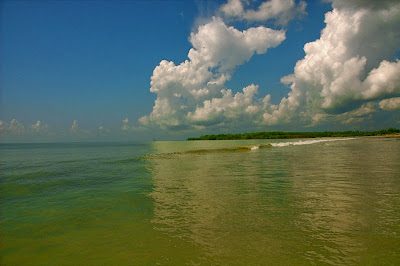 |
| View across water in the Sundarbans of Bangladesh. (c) bri vos |
Authors Katharina D. Six, Silvia Kloster, Tatiana Ilyina, Stephen D. Archer, Kai Zhang & Ernst Maier-Reimer in this article have investigated the effects of ocean acidification on the global warming. It follows the abstract of the article published on the journal Nature Climate Change.
Climate change and decreasing seawater pH (ocean acidification) have widely been considered as uncoupled consequences of the anthropogenic CO2 perturbation. Recently, experiments in seawater enclosures (mesocosms) showed that concentrations of dimethylsulphide (DMS), a biogenic sulphur compound, were markedly lower in a low-pH environment. Marine DMS emissions are the largest natural source of atmospheric sulphur and changes in their strength have the potential to alter the Earth’s radiation budget. Here we establish observational-based relationships between pH changes and DMS concentrations to estimate changes in future DMS emissions with Earth system model climate simulations. Global DMS emissions decrease by about 18(±3)% in 2100 compared with pre-industrial times as a result of the combined effects of ocean acidification and climate change. The reduced DMS emissions induce a significant additional radiative forcing, of which 83% is attributed to the impact of ocean acidification, tantamount to an equilibrium temperature response between 0.23 and 0.48 K. Our results indicate that ocean acidification has the potential to exacerbate anthropogenic warming through a mechanism that is not considered at present in projections of future climate change.
Follow this link for more information about this article: Nature Climate Change 3, 975–978 (2013)
Authors and affiliations:
Climate change and decreasing seawater pH (ocean acidification) have widely been considered as uncoupled consequences of the anthropogenic CO2 perturbation. Recently, experiments in seawater enclosures (mesocosms) showed that concentrations of dimethylsulphide (DMS), a biogenic sulphur compound, were markedly lower in a low-pH environment. Marine DMS emissions are the largest natural source of atmospheric sulphur and changes in their strength have the potential to alter the Earth’s radiation budget. Here we establish observational-based relationships between pH changes and DMS concentrations to estimate changes in future DMS emissions with Earth system model climate simulations. Global DMS emissions decrease by about 18(±3)% in 2100 compared with pre-industrial times as a result of the combined effects of ocean acidification and climate change. The reduced DMS emissions induce a significant additional radiative forcing, of which 83% is attributed to the impact of ocean acidification, tantamount to an equilibrium temperature response between 0.23 and 0.48 K. Our results indicate that ocean acidification has the potential to exacerbate anthropogenic warming through a mechanism that is not considered at present in projections of future climate change.
Follow this link for more information about this article: Nature Climate Change 3, 975–978 (2013)
Authors and affiliations:
Max Planck Institute for Meteorology, Bundesstrasse 53, 20146 Hamburg, Germany
Katharina D. Six, Silvia Kloster, Tatiana Ilyina & Ernst Maier-Reimer
Plymouth Marine Laboratory, The Hoe, Plymouth PL1 3DH, UK
Stephen D. Archer
Bigelow Laboratory for Ocean Sciences, 60 Bigelow Dr., PO Box 380, East Boothbay, Maine 04544, USA
Stephen D. Archer
Pacific Northwest National Laboratory, PO Box 999, MSIN K9-24, Richland, Washington 99352, USA
Kai Zhang
Deceased
Ernst Maier-Reimer
Katharina D. Six, Silvia Kloster, Tatiana Ilyina & Ernst Maier-Reimer
Plymouth Marine Laboratory, The Hoe, Plymouth PL1 3DH, UK
Stephen D. Archer
Bigelow Laboratory for Ocean Sciences, 60 Bigelow Dr., PO Box 380, East Boothbay, Maine 04544, USA
Stephen D. Archer
Pacific Northwest National Laboratory, PO Box 999, MSIN K9-24, Richland, Washington 99352, USA
Kai Zhang
Deceased
Ernst Maier-Reimer
No comments:
Post a Comment